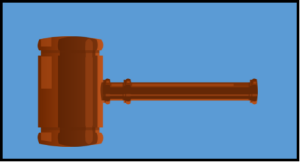Women Judges Launch Effort to Protect State Courts
 Women judges across the nation are spearheading a civics education campaign on behalf of state courts, and one of the leaders of the effort is N.C. Supreme Court Justice Robin Hudson.
Women judges across the nation are spearheading a civics education campaign on behalf of state courts, and one of the leaders of the effort is N.C. Supreme Court Justice Robin Hudson.
The National Association of Women Judges (NAWJ) has launched the “Informed Voters – Fair Judges Project” to protect the integrity of state judicial systems.
“All across the nation, the fairness and impartiality of state court judges are being threatened by powerful special interests seeking to tip the scales of justice in their favor,” says the association’s website. “Their success or failure rests on their ability to mislead voters, particularly if they lack sufficient knowledge about how impartial courts uphold the law. The Informed Voters Project was born from this concern.”
The voters’ initiative is non-partisan. Its goals are to increase public awareness about the judiciary, inform voters that politics has no place in the courts, and give voters the tools they need to ensure judges are chosen on the basis of their character and ability.
To do this, the association offers a range of educational tools in English and Spanish to help judges, lawyers and educators teach citizens about the role of our courts and how to make informed choices of justices and judicial candidates.
National Association of Women Judges
Here are the leaders of the NAWJ:
- Hon. Tani Cantil-Sakauye – Chief Justice, California Supreme Court (Co-chair, Informed Voters Project)
- Linda Leali – Attorney, Miami, Florida (Co-chair, Informed Voters Project)
- Annette Boyd Pitts – Executive Director, Florida Law Related Education Association, Inc. (Director of Education, Informed Voters Project)
- Hon. Barbara Pariente – Justice, Florida Supreme Court (Co-chair, NAWJ Judicial Independence Committee)
- Hon. Robin Hudson – Justice, North Carolina Supreme Court (Co-chair, NAWJ Judicial Independence Committee).
Justice Starts at Home
When most people think of judges and courts, they focus on the federal level, most specifically the U.S. Supreme Court.
But most of the action takes place at the state level.
“Ninety-five percent of all cases are filed in state court, with more than 100 million cases coming before nearly 30,000 state court judges each year,” according to the New York University School of Law’s Brennan Center for Justice. “In recent years, state supreme courts have struck down tort reform legislation, ordered state legislatures to equalize funding for public schools and declared a state’s death penalty unconstitutional.”
But as the significance of state courts increases, so does their politicization.
“[I]n recent decades, judicial selection has become increasingly politicized, polarized, and dominated by special interests — particularly but not exclusively in the 39 states that use elections to choose at least some of their judges.”
Pennsylvania has been cited by the Brennan Center as one egregious example. That state’s 2015 supreme court election for three open seats set a new record for campaign spending. Most of the money came from business interests, labor unions and plaintiffs’ lawyers — groups that are regularly involved in cases before the court. Millions were spent on negative ads portraying candidates as being soft on crime and failing to protect women and children. Research has shown this type of attack makes judges more likely to rule against criminal defendants.
And in a state where people of color comprise more than 20 percent of the population, the Pennsylvania Supreme Court remains all-white.
What do you say? What are your thoughts on state court elections and campaigning?
Sources:
- National Association https://ivp.nawj.org/
- Brennan Center For Justice, New York University School of Law https://www.brennancenter.org/publication/rethinking-judicial-selection-state-courts




